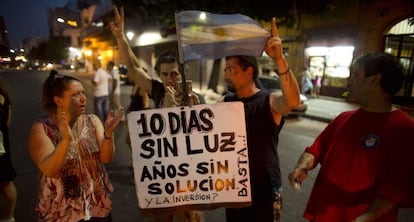Argentina left in the dark by series of power outages
Blackouts trigger dozens of demonstrations on streets, roads and railroad lines


The New Year began in Argentina with a government assurance that power had been restored to 98 percent of the hundreds of thousands of households who have gone without it for more than two weeks, in the middle of the longest heatwave on record since 1906.
A historical peak in electricity demand had caused blackouts across entire city blocks in central and northern parts of the country, triggering dozens of demonstrations on streets, roads and railroad lines to protest the ineffectual response by the government and the utility firms Edenor and Edesur.
This comes on the back of provincial police strikes in December that also lasted two weeks and affected 20 out of the 23 provinces, where thousands of businesses were ransacked and 14 people died in standoffs between store owners and looters, as police stood by. A court investigation has found that dozens of law-enforcement officers encouraged or even participated in the looting, even as their superiors pressured provincial governors into approving a 50-percent pay rise for the provincial police force (compared with inflation of 25 percent).
The salary hike will push the provincial fiscal deficit to 2.7 billion euros from 1.1 billion, according to consulting firm ACM.
The figure adds another negative layer to a situation in which a quarter of all citizens are living in poverty. And yet Argentina is not experiencing an economic crisis in the traditional sense of the term. Far from contracting, its economy is expanding at an annual rate of 3.1 percent, according to consulting firm Ferreres - higher than Brazil, Mexico and Spain.
Minimizing stress
But economic and political problems have nevertheless been piling up for President Cristina Fernández de Kirchner, or perhaps more accurately, for Jorge Capitanich, the Chief of the Cabinet of Ministers, who took up his duties just over a month ago. Since Fernández de Kirchner's surgery in October, she has sought to minimize her own exposure to stress and has relied heavily on her chief-of-staff to deal with crises. As a result, Capitanich, who will likely run in the 2015 presidential race, has already seen his popularity drop because of the police strikes and power cuts.
Tu suscripción se está usando en otro dispositivo
¿Quieres añadir otro usuario a tu suscripción?
Si continúas leyendo en este dispositivo, no se podrá leer en el otro.
FlechaTu suscripción se está usando en otro dispositivo y solo puedes acceder a EL PAÍS desde un dispositivo a la vez.
Si quieres compartir tu cuenta, cambia tu suscripción a la modalidad Premium, así podrás añadir otro usuario. Cada uno accederá con su propia cuenta de email, lo que os permitirá personalizar vuestra experiencia en EL PAÍS.
¿Tienes una suscripción de empresa? Accede aquí para contratar más cuentas.
En el caso de no saber quién está usando tu cuenta, te recomendamos cambiar tu contraseña aquí.
Si decides continuar compartiendo tu cuenta, este mensaje se mostrará en tu dispositivo y en el de la otra persona que está usando tu cuenta de forma indefinida, afectando a tu experiencia de lectura. Puedes consultar aquí los términos y condiciones de la suscripción digital.








































